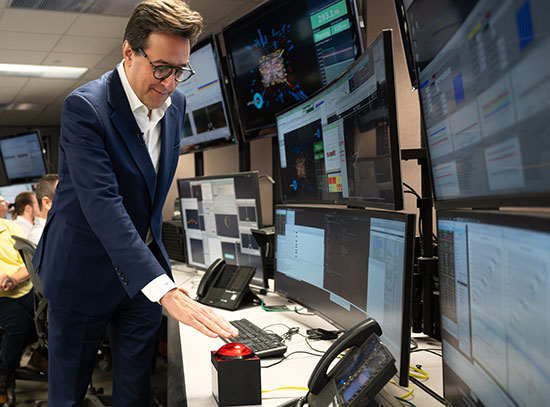MEDIA ADVISORY: The Higgs Boson: Past, Present, and Future
Media availability and symposium at AAAS annual meeting in Boston
February 18, 2013
EVENT: Get the latest on the science news that topped multiple “Top-10” lists for 2012—the discovery of a new elementary particle that fits all descriptions of the long-sought Higgs boson. Physicists from ATLAS and CMS, the two experiments at the Large Hadron Collider (LHC) that saw telltale signs of the new particle in 2011—and have been gathering more data since—will describe details of the search, the latest findings, and future directions for research on the Higgs at the annual meeting of the American Association for the Advancement of Science (AAAS) in Boston, MA.
MEDIA AVAILABILITY: Monday, February 18, 2013, 8:30 a.m., Room 200, Hynes Convention Center
SYMPOSIUM: Monday, February 18, 2013, 9:45-11:15 a.m., Room 306, Hynes Convention Center
DETAILS: The Higgs boson is the last remaining fundamental particle predicted by the Standard Model of particle physics, a powerful theory that has withstood more than four decades of experimental tests, accurately describing the elementary particles and their interactions. An idea first proposed in 1964 was that the Higgs field imparts other elementary particles with their mass through its interactions with them.
Experiments at the LEP collider at the European Organization for Nuclear Research (CERN) and the Tevatron collider at Fermilab have searched for the Higgs boson, but the most compelling findings to date come from experiments conducted at the LHC at CERN in 2011-2012.
Speakers
Howard Gordon, Deputy Chair of the Physics Department at the U.S. Department of Energy’s (DOE) Brookhaven National Laboratory and Deputy Collaboration Board Chair for the LHC ATLAS Collaboration, will relate the history of the Higgs and the capabilities of the two LHC experiments.
Christopher Hill, a professor at the Ohio State University and Deputy Physics Coordinator of the CMS collaboration, will present the detailed data that led to the boson discovery.
Joseph Lykken, a particle theorist at DOE’s Fermi National Accelerator Laboratory and a member of CMS, will talk about the significance of the discovery from a theoretical point of view.
Joseph Kroll, a professor at the University of Pennsylvania and an member of ATLAS, will lead the group in an interactive discussion, touching on broader implications and future research directions.
Media Contacts
Karen McNulty Walsh, Principal Media & Communications Specialist, Brookhaven National Laboratory, kmcnulty@bnl.gov, 631-344-8350
James Gillies, Head of Communication and CERN Spokesperson, James.Gillies@cern.ch, + 41 22 76 741 01
Ashley WennersHerron US LHC Communications, Fermilab/CERN, Mobile: 347-433-3739
More information about Brookhaven National Laboratory’s role in this research.
Brookhaven’s research at the LHC is supported by the Department of Energy’s Office of Science.
DOE’s Office of Science is the single largest supporter of basic research in the physical sciences in the United States, and is working to address some of the most pressing challenges of our time. For more information, please visit science.energy.gov.
2013-11499 | INT/EXT | Newsroom









